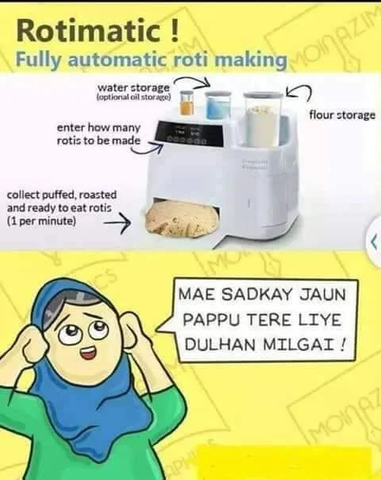The desi tale of the breadmaker of the family and how to rewrite it!

One shouldn’t be fooled by the unassuming appearance of roti - a perfectly cooked roti is no easy feat. It requires a mastery of a specific technique involving mixing and beating the dough until it makes just the right sound. And let's not forget the importance of achieving that perfect roundness and thinness with the rolling pin - no pressure, right? Once you've got that down, you've still got to flip it onto the pan and pray that it rises over the flames like a proud roti warrior.
It's a delicate dance, and only the bravest of chefs dare to attempt it. But once you've tasted a perfect roti, you'll know it's worth all the blood, sweat, and tears (okay, maybe just sweat).
Rotimatic founders Pranoti and Rishi showcase the art of making rotis from scratch to at 12.28
Growing up, the message was clear: women were the bravest of chefs in the kitchen and you must emerge victoriously with “gol rotis”. That means kneading the dough and flipping perfect rotis on a tawa. I watched my mom, aunts, and grandmas go through the motions of cooking and serving with such grace that it made me wonder if they were secretly part-time ballerinas.
But as I grew older, I started to question the gender dynamics of the roti-making process. Was there a hidden cost to all this domestic duty? Did the men in the family secretly fear the power of a perfectly round roti? And most importantly, why did the patriarchy get to claim the reward of delicious food without lifting a finger in the kitchen? The more I thought about it, the more I realized that maybe it was time to spice up the old recipe for gender roles in the kitchen.
Though the world is changing, and the gender roles are blurring, the narrative is still stuck in the 20th century for millions of women. So, let’s address some common comments still encountered by the women of today and best way to address them as a society.
Why can’t you make rotis like my mother?
Ah, the age-old question that most woman making rotis has heard a million times: "Why can't you make rotis like my mother?" Well, let me tell you something, buddy. Did you know? Making rotis is not a competition, and your mother's rotis are unfortunately not the gold standard for every woman out there. Last I checked, every woman is a unique individual with her own set of skills and talents, and making rotis may or may not be a part of the set.
Women have been relegated to the role of the cook and caretaker for far too long, and it is definitely time we recognize their contributions and give them the respect they deserve. By constantly comparing your mother and her cooking abilities, you're perpetuating the idea that women should have a default, in-built roti cooking abilities and sadly that’s not how biology works!
Say if someone constantly compares a guy’s driving skills to an imaginary male benchmark, they are perpetuating the notion that men have to inherently possess superior driving skills because duh ‘you are a man’. Newsflash! That is not how any man wishes to be stereotyped.
So, the next time your beautiful brain is tempted to ask a woman why she can't make rotis like your mother, read the previous paragraph out loud and repeat as many times as necessary. And in the meantime, why don't you try making rotis yourself? Who knows, maybe you'll discover a newfound appreciation for the hard work that goes into your belly.
A woman who can't make rotis is not a good wife/mother.
Ah, the classic pseudo math that a woman's worth is directly proportional to her ability to make rotis. It's funny how such a simple task can be used to judge a woman's character and her potential as a wife or mother.
But let's be real and break the truth here, a woman's ability to make rotis is not directly proportional to her qualities as a person. If a woman chooses to make rotis, that's great. But if she doesn't, that's also great. It's her choice, and no one should be shamed for it. So next time someone tries to diminish a woman's value based on her roti-making skills, just roll your eyes and ask them if they really think domestic skills are the only things that matter in life. Trust me, they'll end up feeling more foolish than someone who's tried to eat a roti with a fork and knife.
Let’s turn the table here, shall we? If a guy were to be labelled a bad husband or a father for not possessing some magical power to fix every electrical gadget in the house, I am pretty sure your BP count is bound to rise. Alas not everyone went to “Electrical Academy of Men”!
So, to address the statement, this is the final verdict. A woman who can't make rotis is still a good wife and still a good mother if she loves and cares for her family, raises her children well, and contributes to society in her own way!
You should learn how to make rotis, it's a basic skill for any woman.
Nothing screams feminism like reducing a woman's worth to her roti-making abilities. Should we also judge men based on their ability to make rotis? Or is it just women who get the pleasure of being defined by their domestic skills?
But hey, if we're going to talk about basic skills for women, how about we start with things like financial literacy, self-defense, and negotiating for higher salaries? You know, skills that will actually help women navigate the world and thrive in their careers, rather than just making sure their husbands and in-laws are well-fed.
And let's not forget that cooking is not just a woman's responsibility. It takes two people to make a baby, so it should take two people to feed that baby. Plus, cooking can be a fun and enjoyable activity for anyone, regardless of gender.
Making rotis is easy, even a child can do it.
Alright, let's get real for a minute here. If a little kid can roll out a roti, there's no reason a full-grown man can't do it too. It's time to break those tired old gender norms and see who's really got the skills to pay the bills (or, in this case, make the perfect roti). I mean, who wouldn't want to witness some friendly competition and good-natured ribbing between family members as they strive to create the ultimate roti?
So, let's forget about who's "supposed" to be doing what in the kitchen and focus on what really matters: delicious food that brings people together. Maybe we'll even discover some hidden talents in the process. Who knows, maybe dad will turn out to be the roti-making champion of the household. It's time to embrace gender-neutral cooking skills and let the best roti-maker win!
If you are looking for some brief and classic comebacks, here is a post to help you through that:
For the ones who are wondering if this medieval mindset still exists, behold the screengrabs from the comments section of this post.




A meme from a Facebook recipe group

While some cheered for it:

Here is a poem published on the Futuress article that throws light on the very emotion.
Roti’s status in a meal
And the status of a woman in our times
Is there a relation by any chance?
If a Roti is not made round and thin
It does not cook properly,
If a girl does not look ‘beautiful’
She cannot get married to a decent family.
It is always a matter of delicious curries
Roti’s presence is a given,
As she does not stay Anita anymore
Throughout her life, she is to be called Mrs. Sinha.
For a Roti, we knead the wheat into a dough,
Like we teach a girl the norms of womanhood.
A Roti is finally served after it rises over the fire
Like a girl after a certain age is ready for marriage.
Like how we break it with our fingers
Dip it in the curry and chew it under our teeth
So soft that it dissolves in the mouth,
A woman is also made in a way
That she does not raise a voice,
Just keeps on doing what she is supposed to do.
Hey woman, are you a Roti?
Love or Exploitation?
A perfect Roti is like a strict teacher - it demands discipline, attention, and precision. It may not be everyone’s forte and definitely can’t be bucketed as a mandatory skillset for one gender. Women are not sous chefs in the patriarchy's kitchen. It's time to let women decide for themselves what they want to do and who they want to be. And as for Roti, let it be appreciated for the delicious and versatile food that it is, not as a tool to define women's worth.